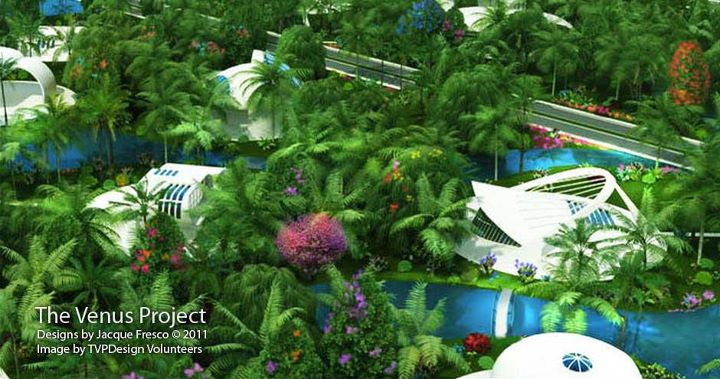“It is well that the people of the nation do not understand our banking and monetary system, for if they did, I believe there would be a REVOLUTION before tomorrow morning”
Evolving from groundbreaking work by The Zeitgeist Movement, Anonymous, The Occupy Movement, countless other highly visible organizations and The Venus Projects decades of dedication to an imagined future free of conflict and poverty, Look. the other Way positions itself as a transitional collective to assist in the shift to an optimistic socioeconomic system. There appears to be an ocean between exponentially growing awareness of the current systems structural flaws and a liveable alternative. We will bridge this gap through our work. COPIOSIS presents a unique and realistic transitional solution and Look. the other Way provides the platform to facilitate its adoption. This is a call to action to participate. Please visit our PROJECTS page to find out how you can get involved.
The Venus Project - The Sustainable Potential of Humanity without the limitations of the current Socioeconomic System
“We cannot solve problems by using the same kind of thinking we used when we created them”
THE SYSTEM
A FAIR SUSTAINABLE ALGORITHM
expected outcomes
- Relative Equality of Access to Formative Early Life Essentials
- Constantly Interactive Incorruptible Democratic Process
- Self-Realization for Maximized Social Participation & Personal Fulfillment
- Resource Assessment & Management for Sustainable Progress
- Maximized Technical Efficiency Freeing Individuals from Unnecessary Work
- Systemic Transparency
- Individual and Group Accountability
- Unprecedented Reduction in Systemic Complexity & Administration
- Intuitive, Accessible & Rewarding Systemic Participation
- Unrestricted Access to Life Supporting Services within Fair Reason
- Instilling Cooperation & Quality Output
- Integral Systemic Evolution to Maintain Natural Social Change
- Ensured Environmental and Personal Balance Aspiration
- Reduction of Divisive & Corrupting Competition
- Governance Reduction & Ultimately Elimination
- Elimination of Individual to Individual Transaction
- Replacing of Ownership with a Usage or Stewardship Principle
THE ALGORITHM
How it works
resource & value assessment
- The Ownership Concept is replaced by a principle of Shared Access and Stewardship
- Resources (natural and human) are measured according to their availability and are expressed in the Algorithm
- Individuals contribute work to the system, earning non-exchangeable Reward Points for their work
- The value of goods and services are democratically arrived at (based on objective and subjective need indexes) and expressed within the Algorithm
- Social & Environmental impacts are expressed within the Algorithm
comparative example:
today, to get an education a teacher must earn a salary funded by the fees a student pay & taxation subsidy an it paid to the teacher by the school. In this system, the value of the teachers work is generated from the algorithm, the school building is a shared use resource for the community and the student earns according to the algorithm for attending the school, due to the fact that a person with an education is of more value to society.
access and consumption
- When final use goods (eg. food, timber, toothpaste) are consumed, the earned Reward Points are cancelled permanently against the algorithmic value of the consumable.
- When reusable/recyclable items are acquired for exclusive use (eg. computer, home, toothpaste container), the reward points are held in the the value of the item and registered to the individual. When returned, the user receives a part refund of their reward points for returning a resource into the system
- This Process is digitally accessible and transparent. There is no monetary exchange between individuals or groups.
- Individuals can form a collaborative to pool their rewards points and increase collective resource access with the goal of providing society with a service or good. They then have shared access, earning points for the work undertaken.
- Individuals can pool their rewards points for shared-access items (share-car, community facility, housing) and opt out when their need is no longer required. This encourages collaborative consumption and reduces resource use
- Debt and interest is not possible in this system as the algorithm only operates using available resources
- Taxation does not exist in this system as reward points are not transferred to pay workers, and use of service/goods are elective
- The goal of the system is to reach Sustainable Equilibrium of end use consumables and regenerating resources. If the supply / need / sustainability index of an item is in perfect equilibrium, that item becomes freely available to all, for as long as that equilibrium is maintained. (see example)
comparative example:
today, to buy a banana, one pays a price that reflects the real or perceived scarcity of the item with the accumulated resources and labour that were used to create the item. The incentive is profit, therefore anywhere along the line of costing the item, a manipulation can be made to increase the potential for profit.
In this system, resource access is guaranteed at a universal price based on scientifically measured information. When that data is measured, the banana is priced universally based on all this true information with the objective and subjective benefits assessed. If the supply / demand / impact is balanced, the banana is free to consume for all. If consumption increases, the banana is charged for again. If supply is too high, the banana is charged for again and those producing bananas earn less for their work.
Reaching equilibrium is the goal as workers will be paid the highest for their work and consumers will pay nothing to consume.
oversight
- Education is the foundation of any truly democratic system. As this system incentivises and rewards education, we are likely to see group decision making coming from a place of insight.
- Every person, collaborative or institution has an accumulated history profile (much like a bank account today). Here the person or organisation has a transparent record of participation - education, skills, character reviews, consumption record, participation history - which is available to all at varying degrees of privacy depending on relevance. Each entity will be subject to Social Trust Index in much the same way as AirBNB, Tripadvisor or Uber operate today.
- Representative Governance will be replaced by Institutions of Specialisation that will emerge out of social need in a meritocratic form and will be transparent and subject to the same Social Trust Index as individuals. We see this today, however these institutions will be more flexible to new understandings in science and evidence.
- Financial Institutions will be irrelevant as individuals will earn according to a standardised system as agreed by society and in line with natural sustainability.
- A Diminished Legal Infrastructure is likely as most of those activities will be handled by the algorithm. With the ownership concept replaced by Access and the removal of transaction currency, much that exists in contemporary law will be irrelevant. Legal mechanisms will exist mainly to manage interpersonal disputes, social conduct and the environment.
- Media and Advertising will likely evolve into a platform for education, public issues promotion and creative expression, rather than consumption and ideology proliferation.
The algorithms variables
Copiosis Table of Variables (Note: this is an early iteration of the system)
the infrastructure
- A Simple and Agreed Values Outline Similar to a Constitution to Set a Broadly Desired Social Outcome
- Equalized Educated Population Base for Critical, Creative and Specialized Thought
- A Participatory and Continuously Reviewed Digitally Operated Resource Management System
- A Real Time Digitally Operated Democratic Participation Platform
- A Digital Social Trust Index Platform for Individuals & Organizations
- A Digital Algorithmic Consolidation Platform for the Earning of Additional Systemic Access
- A Supportive Rehabilitation System Replaces the Punishment Principle
by
THE PLAN
One thing is for certain. The current system is powerful and all consuming. There is barely a place left on earth where a civilization operates outside of some sort of monetary system and its supporting governance structures. Capital in whatever form (the right of exclusive access) is present in every form of governance - socialism, communism, democracy, fascism. The minor differences being only who retains control and power over access.
Our understanding is that if we have a hope of changing this, it will need to be done loosely within the rules of the current system. After all, power today is attained with the securing of capital, most fundamentally land and resources. Furthermore, debt as a concept, has been an extremely effective method of keeping true ownership to a small minority, most notably the facilitators of the financial systems that create the debt. For this reason, this project cannot and never will operate within the debt economy.
By acquiring and re-appropriating capital and resources, we can build momentum to tip the system towards one with a fundamental social value outcome. Realistically, it will be those who truly own within the current system that will be the most resistant to this shift in power. For this reason, it will be a ground-up movement where collective participation will be essential. The result must be attractive and be and an answer so socioeconomic pressures present today. There is no denying that a fundamental adjustment of perception is required by participants. Chances are that you have already made this shift and therefore feel inspired to be a crucial first follower of these ideas.
the Process theory
- Use the for-profit business model to generate income where a large portion is converted into physical assets - land, equipment, resources, technology - purchased outright
- Utilize these assets to increase revenue making
- Donate a portion of the assets to an affiliated 'charity' or 'non-profit' within the internal projects model network
- Re-appropriate these assets after donation into the new system and declare them shared access and common heritage for all participants
- Allow access to goods & services using the Algorithmic model, to participants of the initiative
- Expand, re-appropriate and repeat
phase i
- Build awareness of this collaborative initiative & make contact
- Formulate an organizational structure for effective implementation
- Set the scope for the first projects in line with the values of the organization
- Set a typical workflow and transparent business methodology for effective project development
phase ii
- Build teams of specialized individuals as required by each project
- Compile a project plan per project that meets the value system of the organization including funding requirements and revenue distribution flow if applicable
- Pair money generating projects with their Algorithmic partner/s
- Source capital through non-debt means (crowd funding, philanthropy, etc) if necessary
- Begin work
- Approach existing enterprises that may be open to a shift to this model
phase iii
- Build / Setup localized supporting enterprises designed to support communities
- Reach an equilibrium of growth for capital / resource accumulation & fully sustainable communities
- Increase community size and/or create new affiliated communities
- Share physical and intellectual resources in line with Algorithm
phase iv
- Become a major competing force against existing companies in ethics, work environment, output and lifestyle
- Momentum inevitable
ADDITIONAL READING
The Origin of Money
As with all life on earth, evolution holds the key to understanding money as we know it today. From the vibrant life one person might witness outside their window to the bustling metropolis of anothers view, all have arrived through some form of evolution. It is the law of life as we understand it and it is too the law of our species development and progress. Something today has always come from something that preceded it. Every facet of change or innovation.
Human evolution is particularly interesting to us, well, because we're human. We have somehow evolved a number of seemingly unique, but really, let's say finely developed abilities in a unique combination that has afforded us great power over our surroundings. If we are impartial in this understanding, we can see through this how very much a part of the natural world we are. These combined abilities are:
- Our Physicality - our bodies particularly our hands
- Our Brains - proportionately large in relation to our physicality
- Our Cognition - the extent that we are able to remember the past as well as imagine the future
- Our Vocal Range - the complexity at which we are able to communicate
- Our Social Aptitude - how we are able to connect, collaborate and communicate with members of our own species
This set of abilities is how we have spread ourselves across this finite little blue island of life, engineered our own survival and now dominance. Arguably, above all these traits, it has been our ability to pass knowledge and collaborate that has given rise to the complex societies we live in today. Social evolution has brought us to this point and as with all things evolution, it remains changing.
Without providing a history lesson, it is quite evident how this has developed. For survival, we made tools and produced our own food. For thriving, we developed social structures that expanded and/or conquered. For understanding, we imagined stories that then evolved into what is known as the scientific method. All these developments were intertwined in a stop-start push-pull fashion and remain in play today. The evidence of our species success (as perceived by ourselves) seems to have strangely left us believing that we're separate from the natural laws that dictate life. But, if we accept we are not separate from this movement of life, we can see that we are simply at a point where further evolution will ensue. It is unstoppable.
Returning to social evolution, diverse cultures evolved in pockets across the globe in relative isolation. Our increasing numbers and need for survival, brought conflict or collaboration between expanding civilizations. Trade emerged as a civil method of resolving conflict and/or passing knowledge. In some instances, dominance proved effective in ensuring survival, in other instances collaboration proved more effective. An almost schizophrenic psychology that persists through to today. Trade evolved into representative trade (ie. money) where conflict could be further avoided through mutually agreed value. This innovation proved incredibly effective, later becoming intellectualized. The nature of social evolution is that it does not move at the same pace as our physical evolution, plainly evident across the globe today. Some cultures remain true to age old basic survival needs, whilst others move beyond this, neither more relevant that the other.
Contrary to popular perception, evolution does not result in perfection. We might look at the wonders of nature and marvel its assumed flawlessness, but this is an illusion. Everything remains in a state of change. Everything has arrived to suit the needs of that present moment, but the instant it's environment changes it will be lost forever, bar a few that manage adapt in time. The same is true of ideological, social and systemic structures... and now that environment is changing faster than ever before.
Why Change Now
As with every adaptation along the way, a time comes where what was working, no longer does. In our own bodies we have a coccyx bone, the remanence of a tail that might have stabilized us before we were fully upright. Wisdom teeth still provide a certain portion of the population with aggravation. Society changes in the same way that nature eradicates obsolescence. Can we imagine blatant slavery in our western societies... all powerful monarchies, serfdom, starvation, persistent conflict, public executions, gender control and repression? Newsflash - this may very well be the path back upon which we're headed as we ignore the lessons of history.
Looking at it impartially, we notice that the last few millennia of human progress have been built on systems detached from the fundamental laws that govern life. Some of these systems, it can be argued, have accelerated our technological progress, increased our comfort levels, improved our health and assisted in social cohesion. We do also know that the dominant system today is flawed. It is not a self-operating self-sustaining system. It requires an immense amount of lawmaking and oversight to keep working and it can be manipulated by those that have the power to do so. As wealth provides power today, the wealthy now have control over the laws that that govern the population. Law as it is written today, is broadly open to interpretation. The right amount of money can generate the most convenient argument that in turn sets the desired precedent that defines future rulings. Do you notice a regression to earlier systems that popular revolutions worked tirelessly to overcome? You may not experience it personally, but look at the macro picture. The subjugation of of individuals is now the subjugation of nations. Utopia as an idea can and should never exist (it would be dull and potentially end aspiration), but if we imagined a new system, we assert that it would ensure the following desired outcomes:
- Basic necessity security for all: Food, shelter, community, collective knowledge access, safety, exploration
- Social Cohesion: violence elimination, collaboration, sharing, empathy
- Unlocked Potential: in both the individual and the group for challenge and fulfillment
- Sustainability: Progress making that lasts and that answers to the limits of our environment
- Contentment: a state on maintained safety and comfort in aspiration and development
Our system today holds none of these values integral to is operation. At present it is merely a collection of numbers, now increasingly removed from the physical world, that governs behaviour based on its availability to the individual. The rules of its operation, so malleable and so complex, that the majority of the population that form the citizen electorate are almost entirely uninformed as to how it works. This leaves it open to special interest, specialist insight manipulation.
Democracy as a concept developed from the understanding that collective wisdom is far superior to the insight and power of the few. This of course, is entirely true, but it does assume that all participants are in possession of all the information. We can argue that true democracy has yet to exist. We might have been on a path to democracy when education was universal (in certain western countries) and opportunity equal and fair, but we have never really reached that objective. Certainly never on a global scale. Our system of capital is an insurmountable obstacle in achieving democracy, particularly in its extreme form today. Unequal access to land and resources may be the obvious challenge, but think more about the access to knowledge and innovation. If we think that progress is fast today, particularly in technology, imagine how fast it could have been without patents and/or competitive sabotage. The acquisition of something that is not representative of a social value system or direction, it's only purpose is to be collected or increased. This, in a finite environment, makes for unsustainable mathematics.
Democracy
Democracy as a concept developed from the understanding that collective wisdom is far superior to the insight and power of the few. This of course, is entirely true, but it does assume that all participants are in possession of all the information. We can argue that true democracy has yet to exist. We might have been on a path to democracy when education was universal (in certain western countries) and opportunity equal and fair, but we have never really reached that objective. Certainly never on a global scale. Our system of capital is an insurmountable obstacle in achieving democracy, particularly in its extreme form today. Unequal access to land and resources may be the obvious challenge, but think more about the access to knowledge and innovation. If we think that progress is fast today, particularly in technology, imagine how fast it could have been without patents and/or competitive sabotage. The acquisition of something that is not representative of a social value system or direction, it's only purpose is to be collected or increased. This, in a finite environment, makes for unsustainable mathematics.
Democracy in this new system will be instant, participatory and constant. Something only now achievable with recent technological advances. The problem today is that decision making can be slow. It is also not very representative. We've narrowed the process in many places down to really two parties, both only fractionally different standing guard to the current financial system. The members running these parties, making changes to law and policy, hold no technical insight to do so. Administrators and political game players making broad decisions now favouring special interests, leaving their electorates helpless.
If you think that instant democracy is not possible, consider how you are excising it today. Every time you like an article on Facebook, every time you rate a restaurant on Tripadvisor, every time you rate user on Ebay... you are doing it now. And it's quite enjoyable. You trust a result when more people have participated because you know that the collective consensus is usually not wrong, provided they hold all the information.
Copiosis covers this in their advocating Stigmergy. Some may call a system like this without governance anarchy, but it is in fact the default human collaborative method that preceded thousands of years of our collaboration. We at L.toW refer to it democracy achieved.









